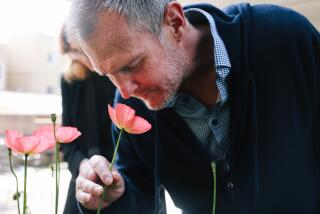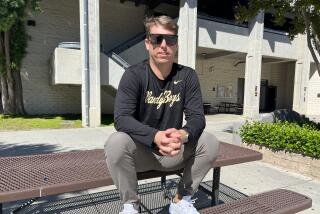‘Talking Tony’ Muser Speaks From Experience
- Share via
BALTIMORE — During his playing career, they used to call him “Talking Tony” Muser. He was non-stop fun, the butt of clubhouse jokes, the guy who always had a smile on his face.
He’s now the hitting coach for the Milwaukee Brewers, and Muser recently took three hours away from a pennant race to do something that always came naturally -- make people smile. But this was different. It wasn’t a laughing matter, and nobody understood that better than Muser.
He was a visitor to the Baltimore Regional Burn Center at Francis Scott Key Hospital. He was there to give, and receive, therapy.
Muser knows firsthand of the agony and depression of a burn unit. He knows about skin grafts, hydrotherapy treatment, body scrubs and the seemingly endless hours spent waiting for even a slight sign of improvement. He has been there -- and he is a walking, talking example of the miracles that take place in burn units every day.
On Feb. 27, 1986, Muser was severely injured in a natural gas explosion at the Brewers’ spring training complex in Arizona. He suffered second- and third-degree burns over 55 percent of his body. He was delirious for more than a week, incapacitated for four months and left with memories indelibly inscribed in his mind.
That he is a major-league coach made Muser a more recognizable visitor to the hospital, but being able to identify with patients made him special.
“You have to hang in there,” Muser repeated over and over again. “It takes a lot of hard work by a lot of good people, but you’ll get better.”
Within minutes, the visit was paying dividends. “We haven’t seen him smile like that since he’s been here,” said physical therapist Linda French as Muser spoke with Mike Lorenzo, who is recovering from burns over 80 percent of his body.
Larry Lewis wasn’t sure how long he had been at the burn center, only that he knew his accident happened on a Sunday. “My memory fades in and out on me,” he said. But, when he was introduced to Muser, Lewis’ face lit up -- and he remembered.
“Tony Muser, yeah,” said Lewis. “You used to play first base for the Orioles.” It has been 12 years since Muser finished his three-year stint in an Orioles uniform.
In the pediatric unit, 14-year-old Kenwan Watts eagerly talked to Muser and was anxious to see his affected areas. Muser rolled up his sleeves to show where skin grafts had been performed and discussed the procedures.
The patient visits provided a noticeable uplift, but it may have been during a one-hour session with the weekly support group that Muser had the most impact.
He shared experiences with Bill Marshall, Mike Rose, Dennis Driscoll, Tom Sparks and Andy Kraft, all of whom had to deal with personal burn-related crises. Physical therapists Pat Prescott and French, occupational therapist Diane Doyle and social worker Gerrie Stancik sat in on the discussion, along with Nadine Weinstein, executive director of the Baltimore Regional Burn Center Foundation, who arranged Muser’s visit.
“What you have to understand,” said Muser, “is that we’re dealing with people who really don’t understand. You come to the conclusion that they’re not going to understand. People who have been burned are a special union.”
Adjusting to the slow pace of recovery, Muser said, “was the turning point of my mental turnaround. When you’re hurt or sick, you’re used to improvement every day, where one day is better than the one before. I thought I was a tough guy who could handle anything, but you don’t know how tough you can be until you go through something like this.”
Muser recalled his impatience in the first weeks of his recovery, when he actually thought he had plotted an escape from the hospital. “I had a plan for my wife (Nancy) to bring a bike to the hospital and leave it outside,” said Muser. “Then when she’d come to visit, I’d have her wheel me up and down the hall until nobody was watching, then we’d zip into the elevator, go downstairs, get on the bike and leave.
“When she came the next day I asked her if she brought the bike. She didn’t know what I was talking about and I got mad. Here I had this great master plan, which I had actually dreamed up, and she didn’t bring the bike.”
Gradually, Muser’s desire to return to baseball began dominating his mental approach to rehabilitation. “Baseball had been such a big part of my life that when it was taken away from me, and I didn’t know if I could get it back, I was in deep depression,” Muser said. “I had to have a goal of getting back to what I wanted to do.”
Muser hit a chord when he left little doubt that he credits his recovery to the therapists who treated him, and the unique relationship he developed with other patients.
“I remember we had a nurse named Judy, we called her ‘Iron Brush’ and I don’t even know her last name,” said Muser. “I don’t have to know her last name -- but she saved my life. When we left we got a piece of plywood and nailed an iron brush and a washcloth to it and gave it to her as a trophy.”
“We have one here, too,” said Marshall. “Her name is Theresa, and she knows how much we appreciate her.”
“I don’t know if I could have made it without those people and support groups,” said Muser. “When we got together like this, we’d all start talking at the same time -- and everybody knew what everybody else was saying.
“Another thing ... I didn’t realize how many friends I really had. I was a macho baseball guy, Tony Muser, I thought I could do it all myself. Then you find out how many friends you have.
“What happened is that a bad experience turned into a great love affair with a lot of people. I like talking about it, because I have to talk about it. It’s a reminder (of the accident), but it’s also a pick-me-up.”
Muser was asked if he was bothered by recurring thoughts of his accident. “I don’t think about getting burned, but if I’m in a car and somebody else is driving -- if that person is shaky, then I’m shaky, too,” said Muser. “The same thing about flying, especially at night. It seems like I dream about a plane crash at least once a month. Those are situations over which I have no control.
“You can’t see my physical scars unless I take my clothes off, but the mental scars are still there.”
Which is why a three-hour break from a pennant race was routine for Muser. He met people he had never seen before, but with whom he shared a common bond.
When he was thanked for taking the time to visit, Muser replied, “You people did more for me today than I did for you. What is time?”
At the Baltimore Regional Burn Center at Francis Scott Key Hospital that day, time was worth a few smiles, something Tony Muser used to take for granted. Now, he knows better.
More to Read
Go beyond the scoreboard
Get the latest on L.A.'s teams in the daily Sports Report newsletter.
You may occasionally receive promotional content from the Los Angeles Times.










